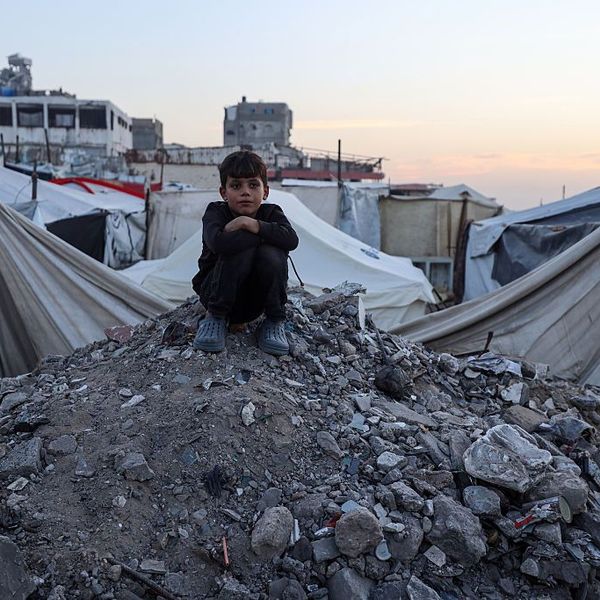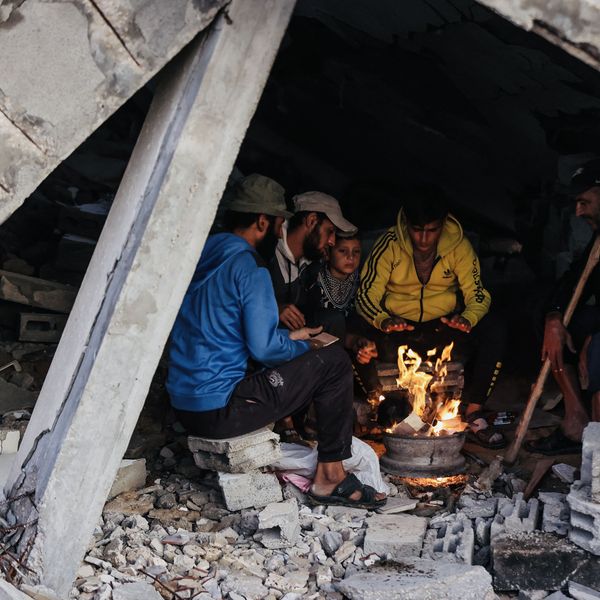Gaza Cut Off From All Sides As 'Collective Punishment' Deepens
Israel and Egypt close border crossings as Gaza struggles to rebuild from Israeli onslaught
Despite widespread calls for increased humanitarian aid and economic activity, the approximately 1.8 million people living in the Gaza Strip have been further isolated from the outside world following Israel's closure Sunday, and Egypt's closure last week, of border crossings into the Palestinian territory.
The Israeli Defense Ministry stated Sunday it has closed its Erez and Kerem Shalom crossings to Gaza in response to a single rocket fire from Gaza, which resulted in no injuries, deaths, or damages. Gisha, a legal center that advocates for Palestinian freedom of movement, reported Monday that both passages remained closed for a second day, save for extremely limited transport of fuel in and medical patients.
The U.S.-backed Egyptian government last week shut the Rafah crossing into Gaza and commenced destroying Egyptian nearby homes to create a so-called "buffer zone" along the border.
Palestinian rights campaigners warn that the closures are especially dangerous as traumatized and displaced Gaza residents struggle to rebuild from Israel's recent seven-week military assault in which 2,000 Palestinians--at least 75 percent of them civilians--were killed.
"As winter approaches, and in the wake of the recent military operation, civilians in Gaza are increasingly vulnerable. Israel, like dozens of donor countries, has recognized the obligation to allow Gaza's urgent reconstruction," the statement from Gisha continued. "Unfortunately, this latest act of closure as a response to rocket or mortar fire can be interpreted as collective punishment and represents a disturbing and dangerous regression to a policy that has harmed hundreds of thousands of civilians and also proven ineffective."
The United Nations Relief and Works Agency (UNRWA) reports that 18 of the school building they administer in the Gaza Strip are currently serving approximately 32,419 internally displaced Palestinians. "The critical immediate priority in Gaza remains the reconstruction of people's homes," writes the agency.
Meanwhile, Defence for Children International-Palestine reports that Gaza residents are scrambling to assemble classrooms following the mid-September start to the school year. At least 26 schools were destroyed in the offensive, 228 were damaged, and another 31 schools continue to serve as shelters for displaced people.
"I think it's shameful that Israel continues to its now seven-year siege on the people of Gaza, following the deadly war and all the destruction created through the war--of houses, factories, and schools," Ramah Kudaimi of the U.S. Campaign to End the Israeli Occupation told Common Dreams. "This is in an additional amount of suffering placed on people in Gaza."
"This means they are not able to get materials to rebuild homes, and they are having to deal with shortages in food, medicine, electricity, and clean water," Kudaimi continued. "In the past seven years, Israel has conducted a massive bombing campaign against Gaza at least three times. People are not being given the opportunity to rebuild their lives."
An Urgent Message From Our Co-Founder
Dear Common Dreams reader, The U.S. is on a fast track to authoritarianism like nothing I've ever seen. Meanwhile, corporate news outlets are utterly capitulating to Trump, twisting their coverage to avoid drawing his ire while lining up to stuff cash in his pockets. That's why I believe that Common Dreams is doing the best and most consequential reporting that we've ever done. Our small but mighty team is a progressive reporting powerhouse, covering the news every day that the corporate media never will. Our mission has always been simple: To inform. To inspire. And to ignite change for the common good. Now here's the key piece that I want all our readers to understand: None of this would be possible without your financial support. That's not just some fundraising cliche. It's the absolute and literal truth. We don't accept corporate advertising and never will. We don't have a paywall because we don't think people should be blocked from critical news based on their ability to pay. Everything we do is funded by the donations of readers like you. Will you donate now to help power the nonprofit, independent reporting of Common Dreams? Thank you for being a vital member of our community. Together, we can keep independent journalism alive when it’s needed most. - Craig Brown, Co-founder |
Despite widespread calls for increased humanitarian aid and economic activity, the approximately 1.8 million people living in the Gaza Strip have been further isolated from the outside world following Israel's closure Sunday, and Egypt's closure last week, of border crossings into the Palestinian territory.
The Israeli Defense Ministry stated Sunday it has closed its Erez and Kerem Shalom crossings to Gaza in response to a single rocket fire from Gaza, which resulted in no injuries, deaths, or damages. Gisha, a legal center that advocates for Palestinian freedom of movement, reported Monday that both passages remained closed for a second day, save for extremely limited transport of fuel in and medical patients.
The U.S.-backed Egyptian government last week shut the Rafah crossing into Gaza and commenced destroying Egyptian nearby homes to create a so-called "buffer zone" along the border.
Palestinian rights campaigners warn that the closures are especially dangerous as traumatized and displaced Gaza residents struggle to rebuild from Israel's recent seven-week military assault in which 2,000 Palestinians--at least 75 percent of them civilians--were killed.
"As winter approaches, and in the wake of the recent military operation, civilians in Gaza are increasingly vulnerable. Israel, like dozens of donor countries, has recognized the obligation to allow Gaza's urgent reconstruction," the statement from Gisha continued. "Unfortunately, this latest act of closure as a response to rocket or mortar fire can be interpreted as collective punishment and represents a disturbing and dangerous regression to a policy that has harmed hundreds of thousands of civilians and also proven ineffective."
The United Nations Relief and Works Agency (UNRWA) reports that 18 of the school building they administer in the Gaza Strip are currently serving approximately 32,419 internally displaced Palestinians. "The critical immediate priority in Gaza remains the reconstruction of people's homes," writes the agency.
Meanwhile, Defence for Children International-Palestine reports that Gaza residents are scrambling to assemble classrooms following the mid-September start to the school year. At least 26 schools were destroyed in the offensive, 228 were damaged, and another 31 schools continue to serve as shelters for displaced people.
"I think it's shameful that Israel continues to its now seven-year siege on the people of Gaza, following the deadly war and all the destruction created through the war--of houses, factories, and schools," Ramah Kudaimi of the U.S. Campaign to End the Israeli Occupation told Common Dreams. "This is in an additional amount of suffering placed on people in Gaza."
"This means they are not able to get materials to rebuild homes, and they are having to deal with shortages in food, medicine, electricity, and clean water," Kudaimi continued. "In the past seven years, Israel has conducted a massive bombing campaign against Gaza at least three times. People are not being given the opportunity to rebuild their lives."
Despite widespread calls for increased humanitarian aid and economic activity, the approximately 1.8 million people living in the Gaza Strip have been further isolated from the outside world following Israel's closure Sunday, and Egypt's closure last week, of border crossings into the Palestinian territory.
The Israeli Defense Ministry stated Sunday it has closed its Erez and Kerem Shalom crossings to Gaza in response to a single rocket fire from Gaza, which resulted in no injuries, deaths, or damages. Gisha, a legal center that advocates for Palestinian freedom of movement, reported Monday that both passages remained closed for a second day, save for extremely limited transport of fuel in and medical patients.
The U.S.-backed Egyptian government last week shut the Rafah crossing into Gaza and commenced destroying Egyptian nearby homes to create a so-called "buffer zone" along the border.
Palestinian rights campaigners warn that the closures are especially dangerous as traumatized and displaced Gaza residents struggle to rebuild from Israel's recent seven-week military assault in which 2,000 Palestinians--at least 75 percent of them civilians--were killed.
"As winter approaches, and in the wake of the recent military operation, civilians in Gaza are increasingly vulnerable. Israel, like dozens of donor countries, has recognized the obligation to allow Gaza's urgent reconstruction," the statement from Gisha continued. "Unfortunately, this latest act of closure as a response to rocket or mortar fire can be interpreted as collective punishment and represents a disturbing and dangerous regression to a policy that has harmed hundreds of thousands of civilians and also proven ineffective."
The United Nations Relief and Works Agency (UNRWA) reports that 18 of the school building they administer in the Gaza Strip are currently serving approximately 32,419 internally displaced Palestinians. "The critical immediate priority in Gaza remains the reconstruction of people's homes," writes the agency.
Meanwhile, Defence for Children International-Palestine reports that Gaza residents are scrambling to assemble classrooms following the mid-September start to the school year. At least 26 schools were destroyed in the offensive, 228 were damaged, and another 31 schools continue to serve as shelters for displaced people.
"I think it's shameful that Israel continues to its now seven-year siege on the people of Gaza, following the deadly war and all the destruction created through the war--of houses, factories, and schools," Ramah Kudaimi of the U.S. Campaign to End the Israeli Occupation told Common Dreams. "This is in an additional amount of suffering placed on people in Gaza."
"This means they are not able to get materials to rebuild homes, and they are having to deal with shortages in food, medicine, electricity, and clean water," Kudaimi continued. "In the past seven years, Israel has conducted a massive bombing campaign against Gaza at least three times. People are not being given the opportunity to rebuild their lives."

